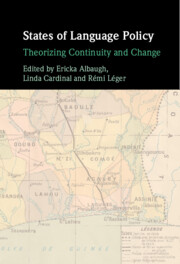Book contents
- States of Language Policy
- States of Language Policy
- Copyright page
- Contents
- Figures
- Tables
- Contributors
- Acknowledgments
- Introduction
- Part I Routes of Change
- 2 Universalism as a State Tradition in Norway and Its Impact on Language Policy Choices
- 3 Policy Change in a Language Regime
- 4 The Decline and Rebirth of Manx Gaelic
- 5 Cultural Heterogeneity and Language Regime Transformation
- 6 Language Regime Change in Peru
- Part II Dependent Relationships
- Part III Levels of Governance
- Conclusion
- Index
- References
2 - Universalism as a State Tradition in Norway and Its Impact on Language Policy Choices
from Part I - Routes of Change
Published online by Cambridge University Press: 14 November 2024
- States of Language Policy
- States of Language Policy
- Copyright page
- Contents
- Figures
- Tables
- Contributors
- Acknowledgments
- Introduction
- Part I Routes of Change
- 2 Universalism as a State Tradition in Norway and Its Impact on Language Policy Choices
- 3 Policy Change in a Language Regime
- 4 The Decline and Rebirth of Manx Gaelic
- 5 Cultural Heterogeneity and Language Regime Transformation
- 6 Language Regime Change in Peru
- Part II Dependent Relationships
- Part III Levels of Governance
- Conclusion
- Index
- References
Summary
By analyzing government documents from 1885 to the present, the chapter first argues that the liberal movement’s introduction of parliamentary rule in Norway in 1884 was a critical juncture in the state’s language regime. During the union with Denmark (1380-1814), Danish replaced Norwegian as Norway’s written language. In 1885, parliament adopted official equality for a new written Norwegian language (Nynorsk) along with Dano-Norwegian (Bokmål). From 1885, The Liberal Party implemented language regulations, and was also the power behind welfare regulations that are often described as universal. Consequently, the state tradition of Norway has been labelled welfare state universalism. The chapter’s second objective is to explore how Norway’s language policy is related to the social welfare model, and to discuss whether the language regime can be considered universalist. The Labour Party came into office in 1935, completing welfare and language reforms introduced by The Liberal Party. The universalist regime was not challenged by any government of the last part of the century. However, parliament will probably adopt a general language law, and this has sparked a new debate on language rights. The chapter’s third objective is to discuss whether Norway’s linguistic universalism is currently at a critical juncture.
- Type
- Chapter
- Information
- States of Language PolicyTheorizing Continuity and Change, pp. 29 - 48Publisher: Cambridge University PressPrint publication year: 2024

